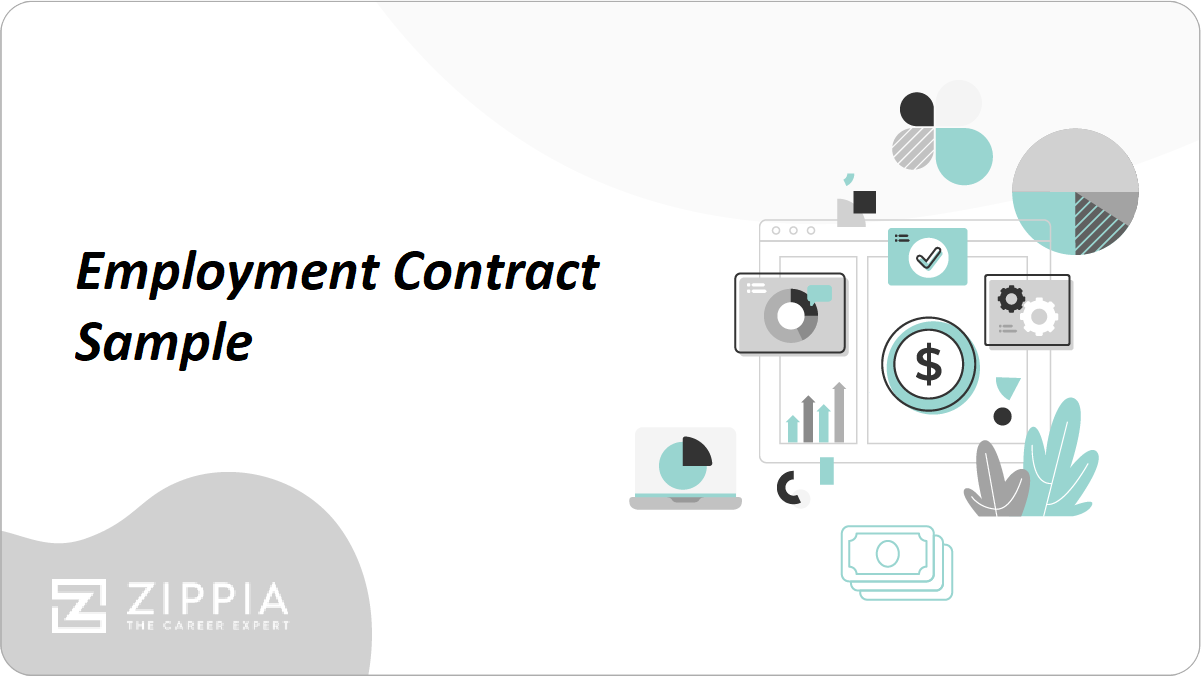Summary. An employment contract is a signed agreement between an employer and employee that defines the obligations of both parties. This document should include the amount the employee will be paid, any benefits they may receive, the hours they must work, and any other information required for their employment. This document will be sent to an employee after they accept the job offer and both parties will sign before or during the first day of work.
An employment contract is sometimes called an employment agreement, and, no matter what you call it, it’s a document that’s often used in business. Some companies use very standard employee contracts when they hire a new employee, and others customize them for different scenarios.
If you’re interested in writing an employment contract, there’s some information that should be included in the contract. We’ve pulled together some tips that will help you write a contract and a sample for you to follow.
Key Takeaways:
-
An employment contract should have the terms of employment such as starting day, working hours, and any other information required by your company.
-
Not everyone will need to have employee contracts, the types of employees and employment that typically have them are:
-
Freelancers
-
High demand
-
Sensitive information or proprietary data
-
Competitive market
-
-
Employment contracts help give a clear understanding of job duties and tasks that are required by an employee.

Parts of an Employment Contract
Each employment contract will have some differences. You may have several employees doing the same job, but it’s possible that they have different pay rates. You might also have several different positions within one company, so there are many different tasks and duties. No matter what the specifics are, each employment contract should contain the following:
-
Names of all involved parties
-
Terms of employment, including start date, working hours, and other information that may be required in your jurisdiction or within your company
-
Job responsibilities
-
Compensation details include how the employee will be paid, how much, any holidays and how they’re handled, vacation days, and any other benefits, including insurance.
-
Specific terms for the position, individual, or situation. These aren’t required, but if they exist, it’s a good idea to include them.
Employment Contract Template
The following is a very general employment contract template to give you an idea of what one might look like. It’s best to craft one and then have it reviewed by an attorney to make sure you’re not missing anything and that you’re not overstepping your bounds in some way.
Employment Contract
This Employment Agreement is being made on May 10, 2022, between Frances Clare (Employee) and Chipmunk Productions (Employer). Both parties agree to be bound by the terms of this agreement.
Frances Clare is entering employment as a video editor on a full-time basis beginning May 10, 2022. In this capacity, the employee will use digital video editing equipment provided by Chipmunk Productions to edit video in accordance with the instructions of their supervisor or creative director. Other tasks may be requested and required that relate to the position of the video editor.
This is an at-will agreement, and the employee is able to terminate employment at any time. The employer can also terminate the employee at any time without cause.
Compensation for the position of the video editor is salaried at $120,000 per year, gross pay. There will be additional compensation if the employee has to travel, but the majority of the work is done onsite. The employee will also be eligible for 12 days of paid time off and sick leave of up to 24 days per year.
The employee is not entitled to severance.
____________________ ___________
Employer Signature Date
____________________ ___________
Employee Signature Date
What Is an Employment Contract?
An employment contract is typically an agreement between an employer and an employee that defines the scope of work and the obligations of both parties. It also includes the amount the employee will be paid, any benefits they’ll receive, details of the work hours, and potentially some information on what is considered cause for termination.
An employment contract is not a job offer. In most cases, the employee will accept the job offer, and then the details will be ironed out and defined in the employment contract. This is then signed, usually by both parties, before or during the first day of work.
Does Everyone Need an Employment Contract
Not everyone needs to have an employment contract. In fact, it’s more common for people not to have employee contracts, but they can be quite useful and are a good idea. The only downside can be that the contract is binding to both parties, meaning everyone needs to hold to the terms of the contract, even if something changes in the interim – although you may be able to renegotiate the contract.
Some types of employees and employment situations that are more likely to have employment contracts than others are:
-
Freelancers. They’re actually often referred to as contract employees and are hired to fulfill a contract.
-
High demand. If the individual or their skill set is in high demand, it’s a good idea to have an employment contract to lock them in and hold onto them.
-
Sensitive information or proprietary data. If the employee has access to certain information that you do not want to be shared, as it may be a detriment to the company, you should make sure they have an employment contract with non-disclosure.
-
Competitive market. Some employers are worried about their employees learning the business and then stealing clients and starting their own business. In this situation, an employment agreement with a non-compete clause is fairly standard.
Benefits of an Employment Contract
While many companies select not to have employment contracts, there can be some benefits to drawing up the contract and making it a standard part of the employment. The following are benefits that can be good for both employer and employee.
-
Clear understanding of job duties and tasks
-
Spelled out payment and benefits
-
Protection for both parties from a breach
-
Protection for proprietary company information
-
Noncompete clauses
-
Helps employers hold onto employees
-
Gives employees peace of mind
-
Spells out the terms of employment, including the timeframe
Employment Contract FAQ
-
Are employment contracts legally binding?
Yes, employment contracts are legally binding documents. If both parties understand and have signed the contract, it becomes a legal document and a part of the employment file. This means that if either party fails to hold up their end of the deal, they can take the other party to court.
-
Do I need an employment contract for my hires?
No, employment contracts are not required. It’s often a good idea to have an employment contract, but that depends on the situation, the employee, and the company that’s doing the hiring. Some contracts can be more limiting than a business owner wants.
-
Can I break an employment contract?
Yes, you can break an employment contract, but there may be some repercussions. Employment contracts are not meant to tie people to a job for the rest of their lives or stick an employer with one particular employee. Their main goal is to outline what is expected of both parties in regard to duties and compensation.
Many employment contracts then list what is expected of the employee should they quit or lose their job.
-
What does a contract employee mean?
In most situations, a contract employee is someone who is hired for a predefined period of time or on a contract basis. They’re not permanent employees of the company. These people also have employment contracts, but they will be much different than a traditional employee will have.
Many contract employees do not receive benefits in addition to paying for their services, and their contracts can be terminated at any time by either party. But the details are flexible and can be determined on a case-by-case basis.




